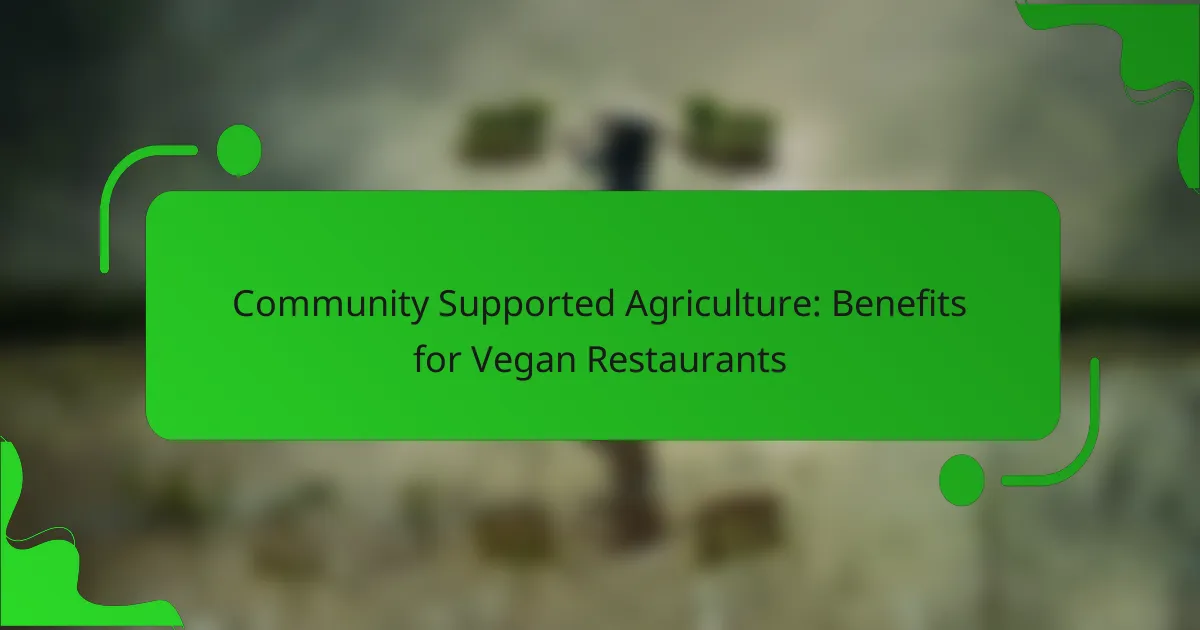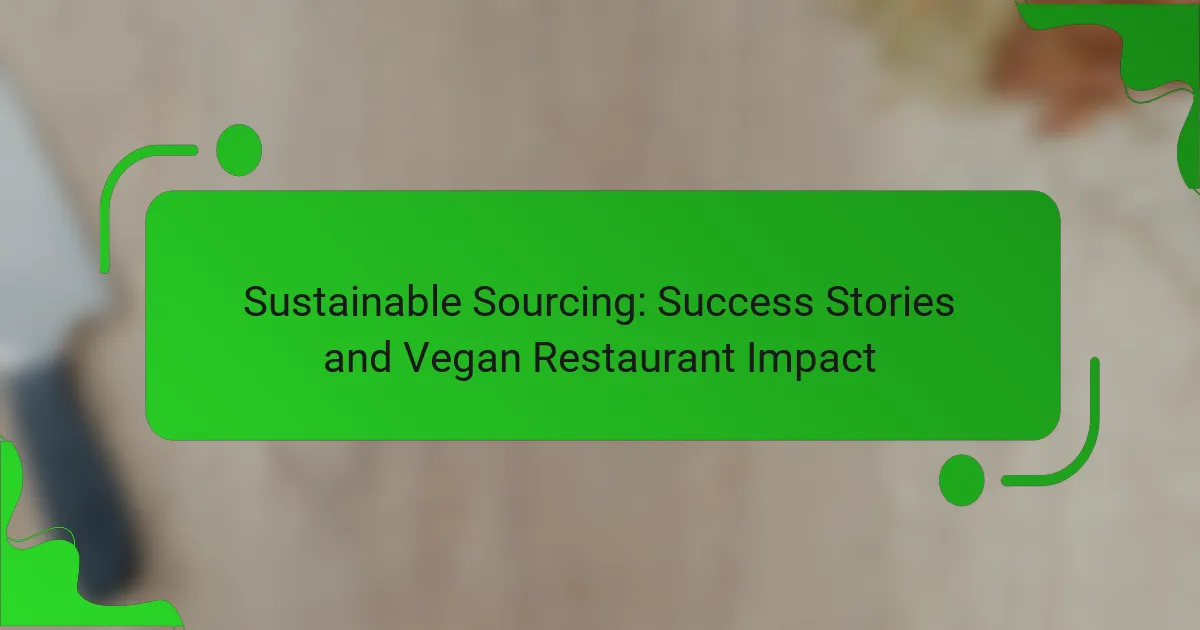Community Supported Agriculture (CSA) provides vegan restaurants with a vital link to local farmers, ensuring a steady supply of fresh, seasonal produce. This partnership not only elevates the quality of dishes served but also promotes sustainability, supports local economies, and fosters a deeper connection with customers who value ethical sourcing.

How can Community Supported Agriculture benefit vegan restaurants in Los Angeles?
Community Supported Agriculture (CSA) offers vegan restaurants in Los Angeles a direct connection to local farmers, ensuring access to fresh, seasonal produce. This relationship not only enhances the quality of ingredients but also supports local economies and sustainability efforts.
Access to fresh, local produce
By partnering with local CSAs, vegan restaurants can source fresh produce that is often harvested just hours before delivery. This results in ingredients that are more flavorful and nutrient-rich compared to those that have traveled long distances.
Additionally, using local produce allows restaurants to create dishes that reflect the seasonal availability of ingredients, appealing to customers who value freshness and sustainability.
Cost savings on ingredients
Engaging with CSAs can lead to significant cost savings for vegan restaurants. By purchasing directly from farmers, restaurants can often avoid middlemen, reducing markup costs associated with traditional supply chains.
Moreover, many CSAs offer subscription models that provide predictable pricing, helping restaurants manage their food costs more effectively. This can be particularly beneficial in a competitive market like Los Angeles.
Enhanced menu diversity
CSAs typically offer a variety of seasonal produce, which can inspire vegan restaurants to diversify their menus. This variety allows chefs to experiment with new ingredients and create unique dishes that attract a broader customer base.
Incorporating a rotating selection of seasonal items not only keeps the menu fresh but also encourages repeat visits from customers eager to try new offerings. This adaptability can be a key differentiator in the vibrant Los Angeles dining scene.

What are the key advantages of Community Supported Agriculture?
Community Supported Agriculture (CSA) offers numerous benefits for vegan restaurants, primarily by providing fresh, local produce while fostering community connections. These advantages include supporting local farmers, reducing carbon footprints, and promoting seasonal eating, all of which align with the values of sustainability and ethical sourcing.
Supports local farmers
By participating in a CSA, vegan restaurants can directly support local farmers, ensuring they receive fair compensation for their produce. This relationship fosters a sense of community and encourages sustainable farming practices, which are vital for the environment.
Restaurants can build partnerships with farmers, allowing them to source unique and high-quality ingredients that may not be available through conventional supply chains. This not only enhances menu offerings but also strengthens local economies.
Reduces carbon footprint
Community Supported Agriculture significantly reduces the carbon footprint associated with food transportation. By sourcing ingredients locally, vegan restaurants minimize the distance food travels, which decreases greenhouse gas emissions.
Additionally, many CSAs employ sustainable farming practices that further lower environmental impact. Choosing to work with these farms can help restaurants align their operations with eco-friendly values, appealing to environmentally conscious customers.
Promotes seasonal eating
CSAs typically offer produce that is in season, encouraging vegan restaurants to create menus that reflect the natural growing cycles. This not only enhances flavor and freshness but also helps chefs innovate with new ingredients throughout the year.
Seasonal eating can lead to cost savings, as in-season produce is often more abundant and less expensive. It also allows restaurants to educate their customers about the benefits of eating locally and seasonally, reinforcing their commitment to sustainability.

How does Community Supported Agriculture improve customer relationships?
Community Supported Agriculture (CSA) enhances customer relationships by fostering direct connections between vegan restaurants and local farmers. This collaboration allows restaurants to offer fresh, seasonal produce while building trust and loyalty with their customers.
Builds community connections
CSAs create a network that links local farmers directly with consumers, including vegan restaurants. By sourcing ingredients from nearby farms, restaurants can promote local agriculture and sustainability, which resonates with customers who value community engagement.
Participating in a CSA can also lead to events such as farm tours or harvest festivals, where customers can meet farmers and learn about food sourcing. These experiences deepen customer relationships and create a sense of belonging within the community.
Encourages customer loyalty
When vegan restaurants commit to using CSA produce, they signal to customers that they prioritize quality and sustainability. This commitment can lead to increased customer loyalty, as patrons appreciate knowing where their food comes from and supporting local businesses.
Additionally, offering exclusive menu items based on CSA produce can entice customers to return frequently. For instance, a restaurant might feature a seasonal dish made with freshly harvested vegetables, encouraging diners to visit regularly to try new offerings.

What are the challenges of implementing Community Supported Agriculture?
Implementing Community Supported Agriculture (CSA) can present several challenges for vegan restaurants, primarily related to sourcing and managing produce. These challenges include seasonal availability of crops and the need for effective logistical coordination.
Seasonal availability of produce
One of the main challenges of CSA is the seasonal nature of produce. Vegan restaurants must adapt their menus based on what is available at different times of the year. This can limit options and require creativity in menu planning.
For instance, while tomatoes may be abundant in summer, root vegetables like carrots and potatoes are more plentiful in winter. Restaurants should establish strong relationships with local farmers to understand seasonal cycles and plan accordingly.
Logistical coordination
Logistical coordination is crucial for the success of a CSA partnership. Vegan restaurants need to manage the timing of deliveries, storage requirements, and inventory levels to minimize waste and ensure freshness. This often involves regular communication with farmers to align on harvest schedules.
Additionally, restaurants should consider the transportation methods used to receive produce. Efficient delivery systems can help reduce costs and maintain the quality of ingredients. Establishing a reliable supply chain is essential for consistent menu offerings and customer satisfaction.

How can vegan restaurants select the right CSA partners?
Vegan restaurants can select the right Community Supported Agriculture (CSA) partners by focusing on local options that align with their menu needs and sustainability goals. Key considerations include evaluating the variety and quality of produce offered, as well as the CSA’s farming practices and reliability.
Evaluate local CSA options
Start by researching CSAs in your area to identify those that provide organic and sustainably grown produce. Look for partnerships that emphasize local sourcing, which can enhance freshness and reduce transportation emissions. A good practice is to visit farms or attend local markets to meet farmers and understand their practices.
Consider the size of the CSA and its membership model. Some CSAs offer flexible subscription plans, while others may require a commitment for the entire season. Choose one that fits your restaurant’s needs and capacity for handling produce deliveries.
Assess produce quality and variety
Quality and variety are crucial for vegan restaurants, as they rely on fresh ingredients to create appealing dishes. Request samples of the produce to evaluate its freshness, flavor, and appearance. Look for CSAs that offer a diverse range of seasonal vegetables, fruits, and herbs to keep your menu exciting.
Additionally, inquire about the CSA’s growing practices, including whether they use pesticides or synthetic fertilizers. Prioritize partners that adhere to organic standards, as this aligns with the values of many vegan customers. A well-rounded CSA can provide unique items that enhance your culinary offerings and attract a broader customer base.

What are the pricing models for Community Supported Agriculture?
Community Supported Agriculture (CSA) pricing models typically involve upfront payments for a share of the harvest, allowing consumers to support local farms while receiving fresh produce. The most common models include subscription-based pricing, which offers regular deliveries, and one-time payment options for seasonal shares.
Subscription-based pricing
Subscription-based pricing in CSA involves customers paying a set fee at the beginning of a season for a regular supply of produce, usually delivered weekly or bi-weekly. This model ensures a steady income for farmers and provides consumers with fresh, seasonal produce throughout the growing period.
Prices for subscription-based models can vary widely, often ranging from $300 to $800 per season, depending on the farm’s size, location, and the variety of produce offered. Vegan restaurants can benefit from this model by securing consistent, high-quality ingredients while supporting local agriculture.
When considering a subscription, restaurants should evaluate the farm’s reliability, the diversity of available produce, and any additional services, such as recipe suggestions or cooking classes. Establishing a strong relationship with the farm can enhance the overall experience and ensure that the restaurant’s needs are met.



